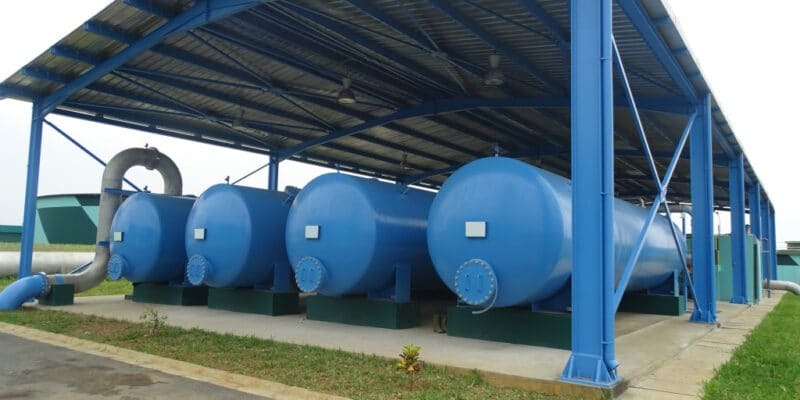Although the Ivorian town of Séguéla is best known for its mining wealth, the water needs of its population are estimated at 5,000 m3 per day for a current production of around 3,200 m3 per day. This town in Ivory Coast, located in the Worodougou region 300 km from the capital Yamoussoukro, now has a UCD (Compact Decentralised Unit), a modular, rapid deployment system prefabricated by the French group Suez.
The installation has a capacity of 100 m3 per hour and will cover the drinking water needs of 200,000 inhabitants, particularly in the districts of Bobi-Diarabana, Dualla, Kamalo, Massala, Sifié and Worofla. The work is located within the treatment plant of the Société de distribution d’eau de Côte d’Ivoire (SODECI) located on the Yani River, whose high water level disrupted water supply in the region in February 2021.
According to the Regional Director of Hydraulics, this compact UCD station is in addition to two other modular stations, one of 150 m3 per hour and the other of 60 m3 per hour. “In the department of Séguéla, the supply of drinking water has very good prospects with the work on the complete treatment plant that will be installed near the Sassandra River, some 70 kilometres away, and whose surface water will be captured, treated and made available to the population,” explains Touré Tonlieumi, who is pleased with the series of government investments in water and sanitation.
A clear future for the water sector
As part of the “Water for All” programme launched in 2019 to strengthen access to drinking water in urban and rural areas, the Ivorian government has already deployed 40 UCD units in 32 towns, notably in Guémon and Cavally, for a total capacity of 92,000 m3 per day.
Read also-IVORY COAST: the State is reinforcing water supply in the cities hosting the 2023CAN
According to the Minister of Hydraulics, Laurent Tchagba, 33 projects in urban areas have enabled the development of an additional hydraulic production capacity of 13,000 m3 per hour, a storage capacity of 11,000 m3, the laying of 182 km of distribution pipes and the construction of 15 boreholes to benefit 3 million Ivorians. In rural areas, 120 boreholes equipped with human-powered pumps, 30 mini drinking water supply systems and 150 solar pumps have been built, while 15,633 human-powered pumps have been rehabilitated for around 9 million people. In 2022, the Ivorian government will devote 600 billion CFA francs (900 million euros) to investment in water supply.
Benoit-Ivan Wansi
